Patricia Murphy has years of experience in working with bereaved children and teens. The co-founder and director of Josie’s Place envisioned her organization as a safe space for kids and families to meet and work through their grief, and Josie’s Place regularly offers children and parent support groups in the Sunset District of San Francisco. SevenPonds sat down to talk to Patricia about Josie’s Place, her own experience with childhood grief, and what Mother’s Day might mean to a grieving child
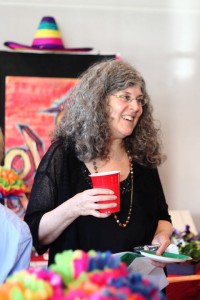
Patricia at a Josie's Place recent fundraising event. Photo by Bowerbird Photography, www.bowerbirdphotography.com
Liz: Tell us about Josie’s Place.
Patricia: Josie’s Place is a small nonprofit that provides grief support to children, teens, and their caregivers. We have evening groups for children between the ages of 5 and 8, and a group for children between the ages of 9 and 13. We’re going to be restarting our teen group hopefully in the next month, which is for high school age youth. In our evening groups, our parents and caregivers meet in separate groups at the same time, so that the whole family receives support. We also lead school-based groups and provide community education. I have trained first responders about how children and teens grieve differently than adults; I’ve worked with school counselors and done training with them; I’ve done workshops in schools for students and parents.
Liz: How did the idea for Josie’s Place come about?
Patricia: I had volunteered for over seven years at Kara in Palo Alto. Kara has a youth and family program based on the same model, which was created by the Dougy Center in Portland, Oregon. I was personally drawn to this work because I was bereaved as a child. My mother died when I was four. And when I was 24, my younger half-siblings lost their mom, my stepmom, who had raised me. Both my mom and stepmom were named Josephine, so Josie’s Place was named in honor of them. I know what it is like to experience such losses without external support, and I wanted to provide an opportunity for families to receive support at the time of the loss.
Liz: How is children’s grief unique from that of adults? Do they deal with it differently?
Patricia: First of all, children don’t have the life experience they need to really understand the impact of their loss. They don’t necessarily have the words in their vocabulary to express it. They also have these natural defenses that keep them from going into emotional overwhelm: they grieve in short bursts, and then they run off to play. People will see them and think, they look like they’re doing just fine; but in fact, they’re grieving just like their parents are. The younger the child, the more this is true.
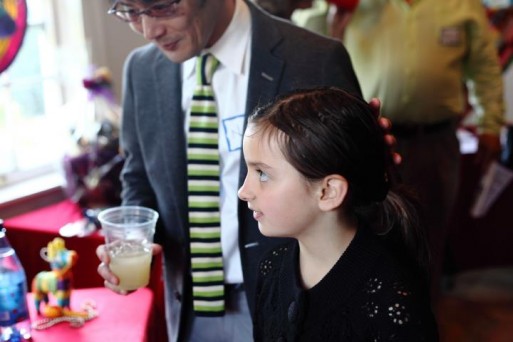
Parents and children at Josie's Place event. Photo by Bowerbird Photography, www.bowerbirdphotography.com
Children’s grief is expressed in their behavior. You’ll see it come out in their play. For instance, the other night we had our anniversary celebration, and there was a little boy whose dad died in a car accident. The boy is five years old, in kindergarten. One of our facilitators was there, hanging out with him—they were playing, and things were crashing and exploding, crashing and exploding. He was doing his grief work right then and there. People may not recognize that that kind of play is how he is processing his grief.
For kids, grief is like “emotion in motion.” They sometimes are misdiagnosed as hyperactive because their grief and stress is centered in their bodies. They might just be acting out more, more anxious, more hyperactive, because they have all this emotional stress they’re carrying. They can also be perceived as having behavioral problems, when in fact it is just expressing their distress.
The other thing that’s really unique about children is that they are known as “delayed mourners” because they can only handle being with their grief for short periods of time, and then their natural defenses kick in, so it takes them longer to work through it. They re-grieve at each new developmental stage. For instance, this five-year-old boy, when he’s seven or eight he’s going to be more cognitively developed and able to take this info in in a new and different way. It’s possible he’ll really start his mourning then. Then, when he’s 10, 11, 12, he’ll take it in in a different way again. Each time children re-grieve it can be just as or more intense as when it first happened. It will become a part of their identification for the rest of their lives. At each new milestone—a graduation, winning a sports tournament, a significant birthday, getting married, having their first child—all those milestones we tend to celebrate with our loved ones, there is an important person missing. It’s not that it necessarily interferes with these events, but it’s always there.
Liz: Describe how a typical kids’ support group session might go. What topics do you discuss? What activities do you engage in?
Patricia: The older kids sit in a circle with stuffed animals. We light candles to create a safe and sacred space, the purpose being to remind them that everything we do, we want to keep it as safe as possible for them. Children tend to feel less safe if they’ve lost a parent or someone significant. They each light a candle in memory of the person or persons who died. Then we have a talking stick; they pass it around the circle and say who died, how they died, the name of the person who died. That’s our opening ritual, to remind us that we’re all there because we lost someone special in our lives.
Our facilitators take turns coming up with a topic, and leading the group. We’ll discuss topics like “Emotions of Grief”: fear and anxiety tend to be primary emotions; anger often comes up around grief and loss; regret—we address different kinds of emotions of grief.
We also feel it’s really important to preserve memories. We’ll create memory boxes, or have nights where they bring in a picture or memorabilia and tell stories about that person and recall a favorite memory.
We talk about how important it is to have support. We ask, what is their internal support? What are the things they can do, the places they can go that help them when they’re having a hard day? Who are their resources, their friends, family, teachers who support them? We have them make a Support Chain, where they write down people, places, things that give them solace when they’re grieving, then they loop them together and put it around their neck.
We do things that build on resiliency. Sometimes kids will just spend time telling jokes, or talking about things that build their self-esteem. When children are bereaved, they often lose self-esteem. They don’t feel like themselves. So we ask, what are the accomplishments you’re proud of?
After the activities, which also involve discussion, different kinds of creative activities, art, drama, play, then they have free time they can use any way they want. They can talk among themselves, or go out and play if the weather’s good. Then they come back and we have a closing ritual. We ask a grounding question to bring them back to the present. Then we do a Love Squeeze: one person starts it, it goes around the circle until it comes back to them, and it reminds us we’re all together and there to support each other.
After groups have ended, the parents come in. We celebrate birthdays if there are any. We make announcements, if there’s important things the kids want to talk about, things to celebrate. Then we also do a Love Squeeze with the entire circle, with the parents and all the kids. This is to bring closure for the entire group.
For the younger kids, we work with the same kinds of topics as the older kids, just targeted at their age group. We do different stations where they can draw if they want, or make a sand tray. It tends to be less verbal and more interactive, through creative expression.
We are restarting the teen group in the next month. Teens often times come up with their own topics and provide support to each other. For teens, their life is under construction anyway, aside from grief. You overlay grief on that, and it makes life in general more complicated. Teens will cover topics besides grief: peer relationships, relationships, normal stresses and strains of being a teen and navigating life, and they touch on grief too.
Liz: How about the parents’ meetings—how do they differ?
Patricia: In the parent group, there is a lot of discussion. It’s an opportunity to give them education on children and grief and what’s important for a grieving child. Then they provide general compassion and support for each other. They’re with a group of people who not just understand they are going through a difficult time but know how they feel. Their losses might be different, but their common ground is grief. Right now we have four moms in the group who have lost their high school sweethearts—those four women really get each other.
Liz: Mother’s Day is this weekend. Do you find that holidays such as this are especially difficult for children and teens who have lost a parent?
Patricia: Yes. Any main holiday—birthdays of the person who died, their own birthdays, anniversaries of the death—all of those times are difficult. On Mother’s Day, if the child has lost a mother—well, if a schoolteacher is savvy, they won’t say, “Write a letter to your mother,” they’ll say, “Write a letter to someone important in your life,” or a letter you’d like to send to your mother if you could. If they have a father who died, on Mother’s Day, it’s a main holiday and the father’s not there to support them. There’s going to be sadness in the family, and children are really sensitive to what’s going on. They know they’re dependent on their parents, and they can be anxious or concerned if they see their parents grieving. These holidays are tender times for them, so we do encourage them to remember their mothers on Mother’s Day. We ask, “Is there an old ritual you want to continue at home on Mother’s Day? Or a new ritual, now that Mom or Dad isn’t there?”
Liz: Finally, what words of advice can you give our SevenPonds readers who may themselves be dealing with loss or may be helping a child to deal with loss?
Patricia: The most important thing is self-care and to understand that each of us grieves in our own unique way. There is no right or wrong way to grieve, so remember not to be self-judgmental about what comes up for you when you are grieving. Get out and get exercise, do things that are nurturing to you, and be aware that it’s still okay to be involved in activities if you’re up for it. Some people might feel guilty that somehow they’re not honoring their loved one when they are engaging in life-giving, life-enhancing activities, and yet we can carry both of these feelings; we can carry the grief and honoring of our loved one and still be engaged in life.
In terms of working with grieving children, it’s always important to tell them the truth in age-appropriate ways, about the person who died and the nature and cause of their death. It’s important to listen, not to push them to talk, but to let them know you’re available anytime they need you. Be aware of any behavioral changes that might be out of the norm, which might signal the children need additional support. And set the same behavior standards: don’t let them get away with stuff just because they’re grieving, but do it with compassion and flexibility. And love them. Let them know they’re loved, and be as patient as you can with them.
Liz: Thanks so much for speaking with us, Patricia!
To learn more about Josie’s Place, or to find out how you can offer your support, visit the website at www.josiesplace.org.
Read related past posts on SevenPonds:
- Art Guides Children and Parents Through Grief – “Dancing with Midwives” Expresses One Woman’s Grieving Process After the Loss of a Child (sevenponds.com)
- Interview with Pediatric Oncology Social Workers – Helping Children and Families Cope with Serious Illness, Loss, and End-of-Life (sevenponds.com)
- Interview with Teri Rose from George Mark Children’s House – The Facility is a Place Where a Family Can Just ‘Be a Family’ in the Face of Terminal Illness (sevenponds.com)

 How to help children cope with death? An Interview with Patricia Murphy
How to help children cope with death? An Interview with Patricia Murphy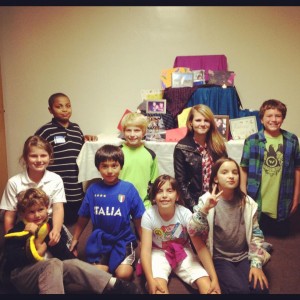
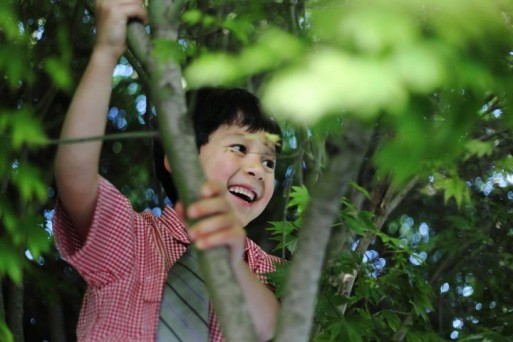
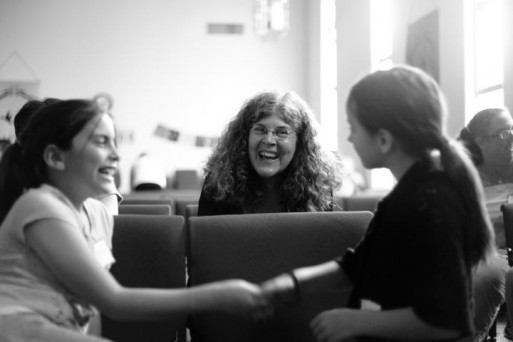



 Funeral Home Owner Chris Johnson Spending Halloween in Jail
Funeral Home Owner Chris Johnson Spending Halloween in Jail
 Our Monthly Tip: Toast a Loved One with a Personalized Glass
Our Monthly Tip: Toast a Loved One with a Personalized Glass
 My Cousin’s Death Taught Me the Meaning of Life
My Cousin’s Death Taught Me the Meaning of Life















informative,revealing. wonderful important work .
Report this comment
Patricia extends beautiful compassion to children and their families.
Report this comment
I’m web surfing but I had to comment on Patricia’s interview. Having experienced the loss of my mother when i was a child deeply impacted my life. There was not the tools and resources back then and I’ve worked hard to live with my memories. Organizations like Patricia’s are beneficial to the health and well-being of those like me who needed support and guidance. I remember many moments back then that as an adult are finally making sense to me. I’ve sorted my life to be present for my children.
Report this comment